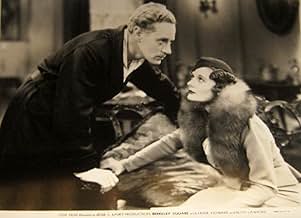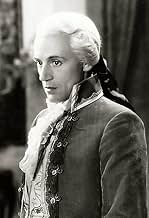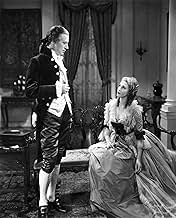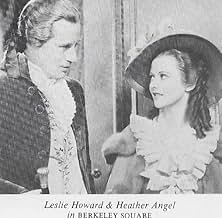A young American man comes to believe that he can will himself back to London in the time of the American Revolution and meet his ancestors, who lived in the house he has just inherited.A young American man comes to believe that he can will himself back to London in the time of the American Revolution and meet his ancestors, who lived in the house he has just inherited.A young American man comes to believe that he can will himself back to London in the time of the American Revolution and meet his ancestors, who lived in the house he has just inherited.
- Nominated for 1 Oscar
- 4 wins & 2 nominations total
Samuel S. Hinds
- The American Ambassador
- (as Samuel Hinds)
Lionel Belmore
- Innkeeper
- (uncredited)
Tom Ricketts
- Town Crier
- (uncredited)
Hylda Tyson
- Maid
- (uncredited)
Featured reviews
BERKELEY SQUARE was a success d'estime of the late Twenties and early Thirties. Based on a short story - THE SENSE OF THE PAST - by Henry James, it tells the story of how Peter Standish (Leslie Howard) travels back in time from the contemporary world into the late eighteenth century, and discovers to his cost that life isn't quite as idyllic as the history books might suggest. John L. Balderston's script isn't without its sentimental moments, but generally takes a hard-nosed look at the ways in which individuals remain as self-centered in the past as they might have been over a century ago. Leslie Howard, who created the past of Standish on the Broadway stage, here recreates his part; he doesn't have to do much other than to look bewildered, which he achieves very competently. Valerie Taylor makes an ideal romantic interest. Director Frank Lloyd was one of Twentieth Century-Fox's most competent contract directors; his version of Noel Coward's CAVALCADE (1933), based on another theatrical hit, is particularly memorable. In BERKELEY SQUARE he creates a brisk narrative, containing a memorable series of transitions between past and present. Definitely worth a look if a copy of the film can be found.
Although this version of Berkeley Square was little more than a photographed stage play it does have Leslie Howard portraying Peter Standish as he did on Broadway for 229 performances during the 1929-1930 season. No other member of the cast repeated their roles. I have to say that the Tyrone Power version from 1951 was and is more cinematically viable.
That being said Leslie Howard was doing a part that was tailor made for him. He's a jaded American scientist who is firmly convinced that he is at some point in time destined to change places with an ancestor also named Peter Standish from the 18th century post American Revolution Great Britain.
When he gets there he mixes and mingles with high and mighty of the day like the Prince Of Wales, Dr. Samuel Johnson, and Sir Joshua Reynolds. And he knows things that others don't and uses all kinds of modern in this case 1928 idioms that first amuse then frighten.
He's in fact pledged to one woman, but falls in love with her sister played by Heather Angel, something he did not count on. It's almost like a trip to Fantasy Island where Mr. Rourke has arranged a trip to the Age of Reason. Usually those trips to some idealized place in history involved a cruel dose of reality as well and in Berkeley Square Leslie Howard gets just such a dose.
Howard and Angel are a wonderfully matched pair of lovers who will meet some day in time and space and know it. Howard earned his first Oscar nomination for Best Actor, the second coming with Pygmalion. Had Berkeley Square been better cinematically it probably would be more revived. As it is it's a great performance by Leslie Howard, one his legion of fans should treasure.
That being said Leslie Howard was doing a part that was tailor made for him. He's a jaded American scientist who is firmly convinced that he is at some point in time destined to change places with an ancestor also named Peter Standish from the 18th century post American Revolution Great Britain.
When he gets there he mixes and mingles with high and mighty of the day like the Prince Of Wales, Dr. Samuel Johnson, and Sir Joshua Reynolds. And he knows things that others don't and uses all kinds of modern in this case 1928 idioms that first amuse then frighten.
He's in fact pledged to one woman, but falls in love with her sister played by Heather Angel, something he did not count on. It's almost like a trip to Fantasy Island where Mr. Rourke has arranged a trip to the Age of Reason. Usually those trips to some idealized place in history involved a cruel dose of reality as well and in Berkeley Square Leslie Howard gets just such a dose.
Howard and Angel are a wonderfully matched pair of lovers who will meet some day in time and space and know it. Howard earned his first Oscar nomination for Best Actor, the second coming with Pygmalion. Had Berkeley Square been better cinematically it probably would be more revived. As it is it's a great performance by Leslie Howard, one his legion of fans should treasure.
Leslie Howard stars in "Berkeley Square," also starring Heather Angel.
Howard plays Peter Standish, who is fascinated by all the material he finds in his house from his 18th century ancestors, 146 years earlier. He believes that if he wants to, he can go back to that time. This film is the predecessor to many time travel films, including Somewhere in Time.
His ancestor, also Peter Standish, visited his house from America on a particular date. Peter changes places with him on that date in the present.
At first, all is well; then he starts slipping and speaking of things in the future to the extent that people begin to believe he is possessed b the devil. The only person who senses the real Peter is Helen Pettigrew (Heather Angel) a Standish cousin. He and Helen fall in love, and she is able to see the future through his eyes -- war, weapons of destruction, neon lights, cars - it all terrifies her. This is the best sequence in the film.
Helen cannot go into the future with him -- and doesn't want to, given what she's seen -- and he's a pariah, and will make her one, if he stays.
This is a charming film badly in need of restoration. Leslie Howard is perfect as Peter -- handsome, ethereal, and well-suited to the period aspects. Heather Angel, whom I've just gotten to know in the Bulldog Drummond series, is delightful, petite and pretty with a soothing voice and a fragility that lends itself well to the role.
Berkeley Square was remade in 1951 as "I'll Never Forget You," starring Tyrone Power, which has a less sober ending - before it was released on DVD, it was in the TCM website's top ten of most requested films to be released as a DVD. There's something appealing about time travel - otherwise, there wouldn't be so many films about it. But there's also something appealing and modern about the premise of Berkeley Square - that all time runs parallel and is all happening at once. Quantum physics would agree that this is so.
Howard plays Peter Standish, who is fascinated by all the material he finds in his house from his 18th century ancestors, 146 years earlier. He believes that if he wants to, he can go back to that time. This film is the predecessor to many time travel films, including Somewhere in Time.
His ancestor, also Peter Standish, visited his house from America on a particular date. Peter changes places with him on that date in the present.
At first, all is well; then he starts slipping and speaking of things in the future to the extent that people begin to believe he is possessed b the devil. The only person who senses the real Peter is Helen Pettigrew (Heather Angel) a Standish cousin. He and Helen fall in love, and she is able to see the future through his eyes -- war, weapons of destruction, neon lights, cars - it all terrifies her. This is the best sequence in the film.
Helen cannot go into the future with him -- and doesn't want to, given what she's seen -- and he's a pariah, and will make her one, if he stays.
This is a charming film badly in need of restoration. Leslie Howard is perfect as Peter -- handsome, ethereal, and well-suited to the period aspects. Heather Angel, whom I've just gotten to know in the Bulldog Drummond series, is delightful, petite and pretty with a soothing voice and a fragility that lends itself well to the role.
Berkeley Square was remade in 1951 as "I'll Never Forget You," starring Tyrone Power, which has a less sober ending - before it was released on DVD, it was in the TCM website's top ten of most requested films to be released as a DVD. There's something appealing about time travel - otherwise, there wouldn't be so many films about it. But there's also something appealing and modern about the premise of Berkeley Square - that all time runs parallel and is all happening at once. Quantum physics would agree that this is so.
Leslie Howard plays an American who takes possession of a bequeathed estate in London's Berkeley Square quarter. While at the house, Howard magically connects to the past, and makes the stunning discovery that time happens all at once. (A topic explored by Christopher Nolan in 2014's Interstellar).
A thunder storm serves as the device that transports Howard from 1933 back to 1784, and in the same Berkeley Square house he would one day inherit. Posing as the recently-arrived American cousin his hosts were expecting, Howard frightens those in his presence by the ability to predict the future, and by his odd phrases. They think he's the devil. But Heather Angel's character, the sister of the woman Howard was slated to marry, sees the truth.
Berkeley Square has a lovely staginess to it, and the air of a drawing room comedy of manners, with sumptuous period costumes. (The film is based on a play by the same name). Howard and Angel capture the loneliness and despair of lovers trapped in different worlds. Historical figures like the painter Sir Joshua Reynolds, and Georgina the Duchess of Devonshire make appearances.
There's a scene in which Angel stares into Howard's eyes, and sees the future: the great Industrial Revolution, with automobiles, trains, airplanes, electricity, tall buildings. She also sees war and destruction. And rather than being in awe of the modern world, she's horrified that God would condemn mankind to such a monstrous future. It's quite prescient. If someone back in 1933 could have had a peak into the future they, like Heather Angel's character, would probably look past the digital gadgets and be horrified, too.
A thunder storm serves as the device that transports Howard from 1933 back to 1784, and in the same Berkeley Square house he would one day inherit. Posing as the recently-arrived American cousin his hosts were expecting, Howard frightens those in his presence by the ability to predict the future, and by his odd phrases. They think he's the devil. But Heather Angel's character, the sister of the woman Howard was slated to marry, sees the truth.
Berkeley Square has a lovely staginess to it, and the air of a drawing room comedy of manners, with sumptuous period costumes. (The film is based on a play by the same name). Howard and Angel capture the loneliness and despair of lovers trapped in different worlds. Historical figures like the painter Sir Joshua Reynolds, and Georgina the Duchess of Devonshire make appearances.
There's a scene in which Angel stares into Howard's eyes, and sees the future: the great Industrial Revolution, with automobiles, trains, airplanes, electricity, tall buildings. She also sees war and destruction. And rather than being in awe of the modern world, she's horrified that God would condemn mankind to such a monstrous future. It's quite prescient. If someone back in 1933 could have had a peak into the future they, like Heather Angel's character, would probably look past the digital gadgets and be horrified, too.
"Berkeley Square" is similar in theme to Jack Finney's "Time and Again." A present day American is transported back to the home of his ancestors in London, during the American Revolution. He knows, of course, what will hap- pen and even falls in love with one of his female ancestors. An old film but a terrific one, with Leslie Howard and Heather Angel.
Did you know
- TriviaS.T. Joshi points to this film as an inspiration for H.P. Lovecraft's novel "The Shadow Out of Time": "Lovecraft saw this film four times in late 1933; its portrayal of a man of the 20th century who somehow merges his personality with that of his 18th-century ancestor was clearly something that fired Lovecraft's imagination, since he had written a story on this very theme himself--the then unpublished "The Case of Charles Dexter Ward" (1927)." Lovecraft called the film "the most weirdly perfect embodiment of my own moods and pseudo-memories that I have ever seen--for all my life I have felt as if I might wake up out of this dream of an idiotic Victorian age and insane jazz age into the sane reality of 1760 or 1770 or 1780." Lovecraft noted some conceptual problems in this film's depiction of time travel, and felt that he had "eliminated these flaws in his masterful novella of mind-exchange over time."
- GoofsThe word Okay (OK) was not used in the 18th century.
- Quotes
Peter Standish: A new Fire of London, that's what's needed here. Yes, and a new Plague too. Dirt, disease, cruelty, smells - Lord, how the eighteenth century stinks!
- ConnectionsReferenced in Don't Bet on Blondes (1935)
- SoundtracksEarly One Morning
(uncredited)
English folk song
- How long is Berkeley Square?Powered by Alexa
Details
- Release date
- Country of origin
- Language
- Also known as
- La plaza de Berkeley
- Production company
- See more company credits at IMDbPro
- Runtime
- 1h 28m(88 min)
- Color
- Aspect ratio
- 1.37 : 1
Contribute to this page
Suggest an edit or add missing content































